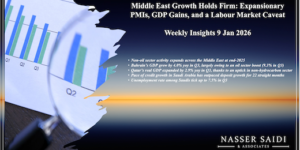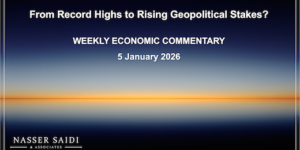Markets
Going into Thanksgiving US stock market took another pause last week with the Dow Jones and the S&P500 slightly down. Other developed stock markets indices from the FT100 to the Nikkei225 were almost flat or mildly in decline with Continental Europe posting the worst performances, despite quite bullish macro data. In emerging markets jitters over China re-emerged, as the data released were on the weak side. Regional markets, on the contrary, were quite resilient and some like Kuwait posted limited gains. Shares in KSA however were quite volatile and recorded another bad week, as the corruption campaign which involved prominent business and political figures, maintains a climate of uncertainty. The global risk-averse mood was more pronounced in fixed income markets, were junk bonds plummeted after suffering the worst outflow since 2014. In currency markets, the dollar lost on major crossed and the euro vaulted again above 1.18 against the greenback. The oil market, after weeks of relentless advances, was slightly down on the week, while gold prices, after a few weeks of mediocre performances, rebounded within striking distance from 1300 USD/ounce, as the investors offloaded risky positions.
Global Developments
US/Americas:
- US inflation rose 0.1% mom in Oct, vs 0.5% in Sep. Energy inflation fell -1%, as a result of a -2.4% decline in gasoline prices. Food prices were unchanged mom, after rising 0.1% in Sep. Core inflation was just 0.2% mom up from 0.1% in Sep.
- US industrial production rose 2.9% yoy (0.9% mom) in Oct vs 2.1% (0.4% mom) in Sep, the best annual performance since Jan 2015, thanks to a 6.4% jump in mining.
- US retail sales growth plummeted in Oct to 0.2% mom vs 1.9% in Sep, with fuel sales sharply down. Excluding gas stations, sales rose 0.4% mom, from 1.5% in Sep.
- US house starts surged 13.7% mom in Oct making up for the loss recorded in Sep but they dropped -2.9% yoy. Multifamily dwellings drove the expansion but single-family starts also rebounded.
- Initial unemployment claims in the US increased by 10K to 249K. Continuous claims dropped by 44K to 1.86 mn, the lowest level since Dec 1973.
Europe:
- Eurozone’s industrial production retreated by -0.6% mom (3.3% yoy) in Sep, after a 1.4% jump in Aug. All sectors declined but the deepest dive (-1.6% yoy) was recorded in capital goods.
- The ZEW expectations index for the eurozone increased to 30.9 in Nov from 26.7 in Oct.
- German GDP in Q3 rose 0.8% qoq (2.8% yoy), surpassing the 0.6% (2.3% yoy) recorded in Q2, the fastest annual pace since mid-2011. All 4 components of GDP strengthened, including net exports that in the past few quarters had given a negative contribution.
- Germany’s inflation slowed to 1.6% yoy in Oct from 1.8% in Sep.
- The ZEW Investor confidence index for Germany rose to 18.7 in Nov from 17.6 in Oct.
- Italian GDP grew 0.5% qoq in Q3 surpassing the 0.3% achieved in Q2. One of the most troubled eurozone economy is finally showing strength, thanks to firmer domestic demand and surging exports.
- UK inflation was unchanged at 3% yoy in Oct, thanks to lower fuel prices. Also core inflation was steady at 2.7% yoy.
Asia Pacific:
- Japan’s Q3 GDP expanded by 0.3% qoq (the seventh consecutive quarter of growth) half the 0.6% in Q2, driven almost entirely by net export, while domestic demand faltered, especially private consumption which dropped -0.5% qoq, the first negative performance in 2 years.
- Final estimates confirmed that Japan’s industrial production rate of growth halved in Sep to 2.6% yoy (-1.0% mom).
- China’s industrial production expanded 6.2% yoy in Oct, down from 6.6% in Sep in part due to the Golden Week holidays. The electronics sector kept its leading position.
- China’s M2 money supply rose 8.8% yoy in Oct vs 9.2% in Sep. It is the slowest annual increase in M2 since at least January 1996, as the authorities try to rein in the exuberant credit growth.
- China’s fixed asset investment growth decelerated to 7.3% in Oct yoy from 7.5% in Sep mainly due to plummeting mining output, while the manufacturing output remained buoyant, especially in electronics.
- China’s retail sales growth declined to an 8-month low of 10% yoy in Oct from 10.3% in Sep.
- Foreign direct investment in China increased 1.9% yoy to USD 102.15 bn in the period Jan to Oct.
- India’s inflation rose 3.6% yoy in Oct from 3.3% in Sep driven by fuel and food prices.
Bottom line: Data from the two major Asian economies last week were rather disappointing, While China is engaged in the rebalancing of its economy away from an export-driven manufacturing powerhouse, Japan’s mediocre GDP and industrial production data cast once again serious doubts on Abenomics and its beggar thy neighbor policy. Fortunately, Euroland continues to surprise on the upside, dispelling fears that the global economy could falter again in 2018.
Regional Developments
- Egypt’s central bank kept interest rates unchanged – the overnight deposit rate at 18.75% and the overnight lending rate at 19.75%. Separately, the central bank disclosed that it had reached terms for a one-year USD 3.1bln repurchase agreement with international banks after paying back the same consortium of banks a similar USD 2bn agreement in the previous week.
- Foreign currency inflows into Egypt reached USD 80bn billion since the central bank floated the pound last year, according to the central bank governor.
- Egypt is not planning to cut fuel subsidies before 30 June 2018 (i.e. end of the current fiscal year), and is planning to stop importing gas before the end of next year, according to the country’s oil minister.
- Egypt’s oil minister disclosed that initial negotiations have begun with Saudi Aramco, to refine oil in Egypt. Saudi Arabia had agreed in Apr last year to provide Egypt with 700k tonnes of refined oil products a month for five years.
- Unemployment rate in Egypt dropped to 11.9% in Q3 2017 from 12.6% a year earlier and 11.98% in Q2 this year. Unemployment among females dipped slightly to 24.4% in Q3, compared to 24.68% in Q2 2017 and 25.9% of Q3 2016.
- Kuwait’s non-oil growth is expected to pick-up over the medium term to about 4%, according to the IMF. The country will also need USD 100bn financing over the next five years, due to mandated transfers to its Future Generations Fund. Excluding FGF contributions and investment income, Kuwait’s overall budget is expected to remain “nearly balanced” (baseline oil price of USD 49 per barrel until 2019). (More: http://www.imf.org/en/News/Articles/2017/11/15/ms111517-2017-article-iv-consultation-with-kuwait-imf-concluding-statement)
- Kuwait’s free trade zone will be moved under the Kuwait Direct Investment Promotion Authority (KDIPA), which will restructure the zone’s commercial, service and investment licenses.
- Kuwait’s oil sector signed 586 contracts worth KWD 2.2bn during the fiscal year 2016-2017; of this, Kuwait Petroleum Corporation accounted for the largest share, signing 321 contracts of a total value of KWD 92mn.
- With Lebanon’s first oil and gas contracts to be concluded by end of this year or beginning of 2018, the country is considering the establishment of a sovereign wealth fund, and has had meetings with Abu Dhabi Investment Authority (ADIA) and Abu Dhabi Investment Council (ADIC) in this context, revealed Lebanon’s energy minister.
- Lebanon central bank’s confirmed that the USD 1.7bn debt swap between it and the Ministry of Finance did not represent another round of the “financial engineering”. The move was likely part of the measures taken to improve the public debt profile, reduce debt-servicing costs, and maintain debt stability.
- In a bid to boost tourism, Oman expanded the list of nationalities eligible for tourist visas: visa entry has been extended to 68 countries, including 39 European nations and 10 South American countries.
- Moodys downgraded Omantel’s long-term issuer rating to Baa3 from Baa2, due to the USD 2.2bn debt taken to acquire a further 12.1% stake (to a total of 21.9%) in Kuwait’s mobile operator Zain.
- Consumer prices in Qatar rose 0.2% yoy in Oct, after falling 0.5% in Sep; housing and utility prices dropped by 5.4% yoy, their biggest fall for at least several years, after declining 4.7% in Sep.
- Saudi Arabia’s central bank governor stated that there were no large outflows of money from the country after the anti-corruption crackdown. In an interview with CNN, he said that “we see some increase, but it’s not that much”.
- Japan’s SoftBank Group Corp plans to invest as much as USD 25bn in Saudi Arabia over the next three to four years, reported Bloomberg. SoftBank plans to invest up to USD 15bn in NEOM, while the SoftBank Vision Fund is planning to invest as much as USD 10bn in Saudi Electricity Co.
- Citigroup, which received a license from the Capital Market Authority, plans to start operations in Q1 2018.
- Saudi Arabia’s Energy Minister stated that OPEC and its allies should extend cuts at the meeting scheduled on Nov 30. He also stated that the market was likely to remain oversupplied by Mar 2018. UAE’s minister of energy also backed extending the cuts. Oman wants to prolong them beyond Mar and sees producers extending them until end-2018.
UAE Focus
- Dubai’s non-oil foreign trade increased by 13% yoy to AED 344bn in Q3 this year. China remains the largest trading partner, accounting for more than 25% of the trade (AED 128.9bn), followed by India and the US at AED 74.1 and 62.4bn respectively.
- Bounced cheques in the UAE: non-fraudulent cases that involve bouncing cheques for amounts not exceeding AED 200,000 will result in a fine and no jail time. The new order comes under the purview of Law No. (1) of 2017.
- UAE transferred USD 707mn in customs fees to the GCC from end-Oct 2015 to end-Oct 2017, according to the Federal Customs Authority.
- Cargo traffic at the Dubai World Central grew 9.1% yoy to a total of 704,735 tonnes of freight from Jan-Sep this year. Passenger traffic was up 7.9% yoy during this period to 649,627 passengers.
- The Abu Dhabi Global Market (ADGM) has issued a consultation paper on a new Remote Membership Framework proposal: this would enable brokers located outside of the ADGM to access exchanges and clearing houses located within ADGM. The paper can be accessed at: https://www.adgm.com/media/209551/01-consultation-paper-no-5-of-2017_proposed_amendments.pdf
- The DIFC announced the establishment of a $100mn fund to invest in early-stage and growth start-ups in the FinTech
- UAE’s Adnoc disclosed that the company plans to sell at least 10% of its stake in its fuel distribution unit in an initial public offering next month on the Abu Dhabi bourse. Separately, an official stated that Adnoc was on track to increase its upstream capacity to 3.5 million barrels per day.
- Emaar Properties raised AED 4.82bn (USD 1.3bn) in the Emaar Development unit’s IPO: selling a 20% stake or 800 million shares, the IPO was priced at AED 6.03, according to a company statement. Institutional investors were allocated 93.8% of the 800 million shares on offer, with retail investors buying the remaining 6.2% subscription. Emaar Development shares will likely be listed on the Dubai Financial Market on Nov 22.
- The combined value of oil and gas projects in the UAE exceeded AED 231bn, according to BNC Network; this accounts for 8% of the total estimated value of oil and gas projects in the region.
Media Review
The next generation of Saudi Rulers
http://www.chicagotribune.com/news/sns-wp-saudi-fp-comment-96961b94-c655-11e7-afe9-4f60b5a6c4a0-20171110-story.html
Growth in an inflationless economy
http://www.theage.com.au/business/innovation/can-growth-lift-the-economy-when-inflation-wont-20171114-gzl9ca.html
The ugly secret of the US labour market
https://www.bloomberg.com/news/articles/2017-11-15/low-unemployment-healing-u-s-job-market-s-ugly-secret-age-bias
Corruption must not destroy the future for the Arab world
https://www.thenational.ae/business/comment/corruption-must-not-destroy-the-future-for-the-arab-world-1.676353
Investors re-price political risk in Middle East bond market
https://www.reuters.com/article/mideast-bonds-repricing/mideast-debt-investors-re-price-political-risk-in-middle-east-bond-market-idUSL8N1NL4E1
Sovereign Funds Should Sell Off Oil Assets
https://www.bloomberg.com/news/articles/2017-11-16/saudi-aramco-s-ipo-just-lost-the-world-s-largest-equity-investor
https://www.bloomberg.com/view/articles/2017-11-17/sovereign-funds-should-sell-off-oil-assets
Powered by:









